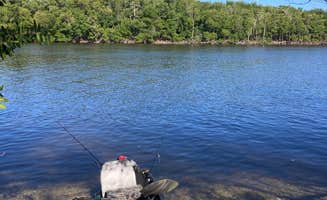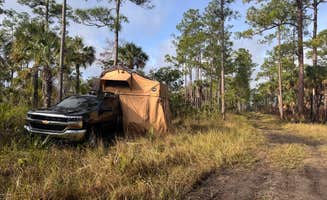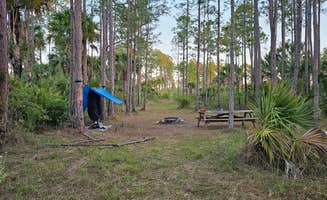Dispersed camping near Everglades City, Florida offers opportunities to experience the subtropical wetland ecosystem during Florida's dry season from November through April. Water levels in this region fluctuate dramatically between seasons, with summer bringing daily thunderstorms and occasional flooding at primitive sites. Most backcountry sites sit at near sea level elevation, creating distinctive drainage patterns that affect trail conditions and accessibility.
What to do
Primitive overnight paddling trips: The backcountry waterways connecting to Backcountry Crooked Creek Chickee provide excellent paddling routes. "This is actually 2 bookable sites. Both nights I stayed, another group showed up late afternoon," notes camper Paul W., highlighting the need to confirm your reservation details before arrival.
Wildlife photography: Dawn hours offer optimal lighting conditions for capturing the diverse bird species that frequent the marsh areas. The waterhole behind Panther Camp provides wildlife viewing opportunities, though caution is necessary as "a gator generally lives there," according to camper J R.
Primitive hiking: The Florida National Scenic Trail passes through several backcountry sites, with connector trails linking different ecosystems. Trail conditions vary significantly with rainfall, and hikers should prepare for wet feet during much of the year.
What campers like
Remote solitude: The isolation of Nobles Primitive Camp appeals to those seeking true wilderness experience. As Trevor G. describes, it offers "Great remote drive out to the primitive site 'old florida' the paved road turns to dirt/gravel. One way in one way out."
Night sky viewing: Limited light pollution at backcountry sites provides exceptional stargazing opportunities during clear winter nights. The open marsh areas adjacent to primitive camps create unobstructed views of constellations.
Hammock camping options: The hardwood hammocks found at Carpenter Primitive Camp offer ideal settings for hammock setups. The elevated position provides better airflow and reduces ground moisture issues common in wetland environments.
What you should know
Seasonal water challenges: Water management requires planning as drinking sources are scarce. At Panther Camp, there's "a water hole in the back of the camp which can be filtered. However a gator generally lives there. Better to pack your water in," advises J R.
Tidal impacts on paddling: Chickee platforms require timing water travel with tides. One Crooked Creek Chickee visitor warns, "Make sure you go with the tide, it was moving 3-4 during my paddle."
Access road conditions: Many primitive sites have weather-dependent accessibility. At Nobles Primitive Camp, "Luckily the access road was drivable with two wheel drive," reports Trevor G., though this can change rapidly after rainfall.
Permit enforcement: While permits are required for most backcountry sites, enforcement varies by season and location. J R. notes about Panther Camp: "There is no cost to stay, no reservations needed. You can fill out a permit from the website. However I have never been asked for it."
Tips for camping with families
Pack extra insect protection: Families should bring sufficient bug spray and mosquito netting, particularly for dawn and dusk hours when mosquito activity increases. The screened platform at Ivy Primitive Camp provides better protection from insects than open sites.
Water safety planning: Children must be constantly supervised near water due to alligator presence. Establish clear boundaries at campsites and explain wildlife safety protocols before arrival.
Weather monitoring: Summer thunderstorms develop quickly in the afternoon, often with little warning. Families should have a clear evacuation plan if weather conditions deteriorate, particularly at boat-in sites.
Tips from RVers
Limited dispersed options: Traditional RV camping is largely unavailable at primitive backcountry sites. Most dispersed camping near Everglades City requires boats, hiking, or high-clearance vehicles.
Base camp strategy: Use established campgrounds with facilities as a base camp for day trips to explore primitive areas. This allows access to backcountry experiences while maintaining RV conveniences.
Road condition research: Call ranger stations for current road conditions before attempting access to remote sites. After heavy rains, even high-clearance vehicles may struggle with certain access routes.




